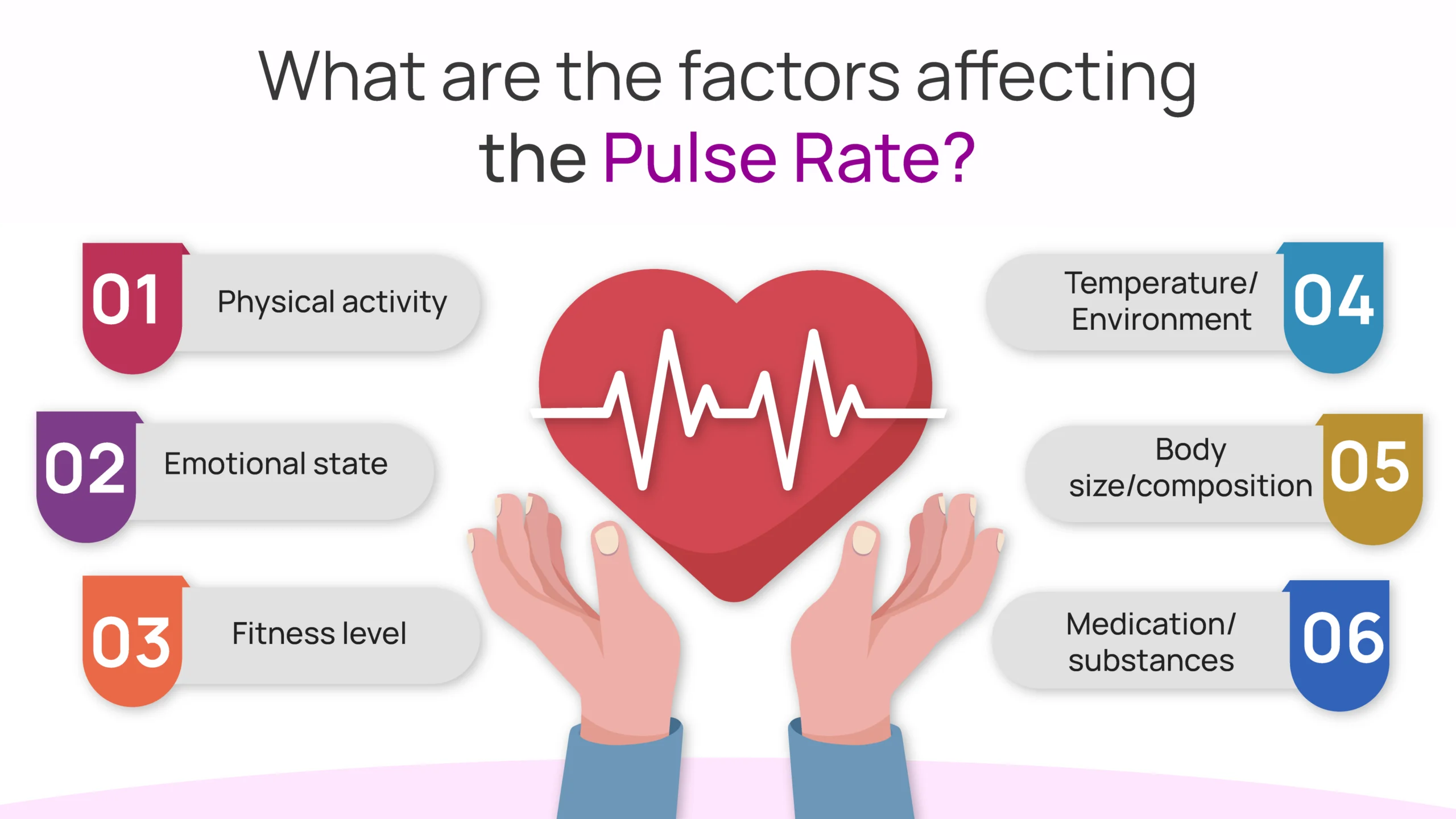
Author:- Mr. Ritesh Sharma
The pulse rate is characterized by the contraction and relaxation of the heart in a minute. It is measured by the united BPM whose full form is beats per minute. It is important to study the factors affecting the pulse rate. This is because due to the fluctuations in the pulse rate, we can be affected by various cardiovascular conditions, such as tachycardia and bradycardia. The difference between tachycardia and bradycardia is that the former is characterized by an elevated heart rate exceeding the normal high range of 100 beats per minute. On the other hand, the latter is characterized by a low heart rate going below the normal low range of 60 beats per minute.
The factors affecting the pulse rate are important to learn for people to adopt correct prevention methods. If you want to monitor your heart health properly, then you must learn about the factors affecting the pulse rate. In this blog, we will examine all the factors affecting the pulse rate. So, if you want to learn more about these factors, you will be educated and empowered by this blog.
The Factors affecting the Pulse Rate
There are various factors affecting the pulse rate. Some of these factors pose absolutely no harm to cardiovascular health. For example, exercise-induced tachycardia due to physical exertion increases the heart rate and causes fleeting heart palpitations. Due to this, the pulse rate can temporarily go above 100 beats per minute. Instead of harming your cardiovascular health, this improves your cardiovascular strength by forcing the heart to pump blood with more efficiency.
On the other hand, the pulse rate can go below 60 BPM during sleep as we attain the condition of nocturnal bradycardia. This once again pose no harm to cardiovascular health and is a completely normal condition. However, fluctuations in the pulse rate due to medications and substances can prove to be harmful for your heart. Let’s study all the factors affecting the pulse rate below.
Physical Activity
One of the most influential factors on pulse rate is physical activity. When we exert ourselves, our muscles demand more oxygen and nutrients, necessitating increased blood flow. In response, the heart beats faster to pump oxygen-rich blood to the muscles, leading to a rise in pulse rate. This effect can be immediate during exercise and can persist for some time afterward as the body recovers.
Age
Age plays a significant role in determining baseline pulse rates. Generally, infants and young children have faster resting heart rates compared to adults. As we age, our pulse rates tend to decrease gradually. This decline is partly due to changes in heart muscle function and efficiency. However, it’s essential to note that individual variations exist within each age group, and other factors can influence this trend.
Fitness Level
The cardiovascular system of a physically fit individual operates more efficiently than that of a sedentary person. Regular exercise strengthens the heart muscle, enabling it to pump blood more effectively with each beat. Consequently, fit individuals typically have lower resting heart rates because their hearts can accomplish the same task with fewer contractions. Conversely, poor fitness levels may result in a higher baseline pulse rate.
Emotional State
Our emotions can have a profound impact on our pulse rate. When we experience stress, fear, anxiety, or excitement, our body’s fight-or-flight response is activated. This triggers the release of adrenaline, a hormone that prepares the body for action. Among its effects is an increase in heart rate, priming us to respond to perceived threats or challenges. Conversely, feelings of relaxation or contentment can lower the pulse rate as the body shifts into a state of rest and recovery.
Body Size and Composition
Individuals with larger body sizes often have higher resting pulse rates compared to those with smaller frames. This is because a larger body requires more oxygen and nutrients, necessitating increased blood circulation. Additionally, body composition plays a role; individuals with a higher proportion of muscle mass may have lower resting heart rates due to their more efficient metabolism and cardiovascular system.
Medication and Substances
Certain medications, such as stimulants like caffeine or decongestants, can elevate pulse rate as a side effect. Conversely, medications like beta-blockers, which are used to treat conditions such as hypertension, can lower heart rate by inhibiting the effects of adrenaline on the heart. Similarly, substances like nicotine and alcohol can influence pulse rate, albeit temporarily and in varying degrees depending on individual tolerance and consumption levels.
Temperature and Environment
Environmental factors, such as temperature and altitude, can affect pulse rate. In hot weather, the body may increase blood circulation to help regulate temperature through processes like sweating. Similarly, exposure to high altitudes can lead to lower oxygen levels in the air, prompting the heart to beat faster to compensate for decreased oxygen availability.
So, these are all the factors affecting the pulse rate. In some ways, some of these factors do good by fluctuating our pulse rate by improving our cardiac strength and provide our mind relief during sleep. Therefore, the fluctuations in the pulse rate due to these factors warrant no medical attention. However, if the change in the pulse rate is persistent then it could be due to some underlying cardiac conditions, such as cardiac arrhythmias of different arrhythmia classifications, etc. In such a scenario, you must consult a healthcare professional promptly and seek worthy advice and if required medication.



